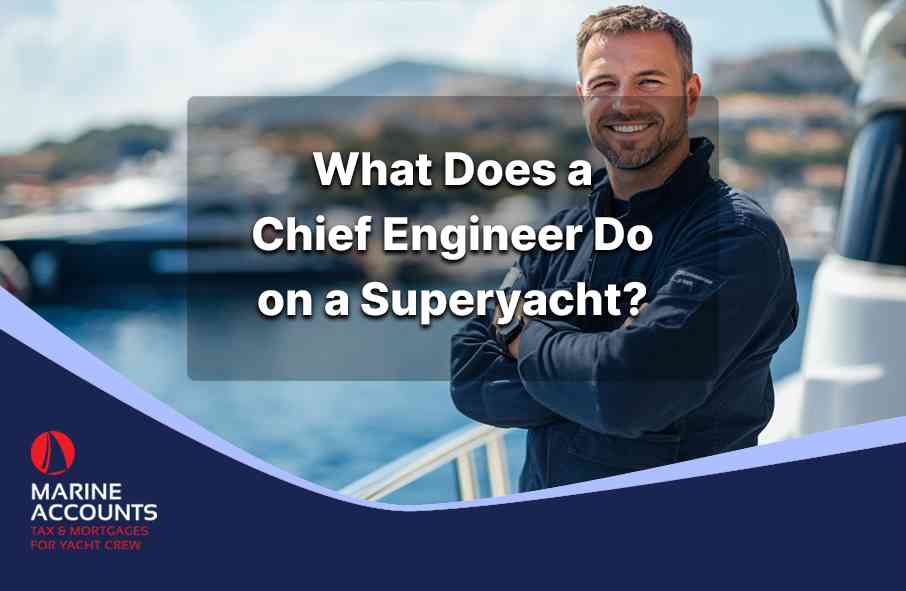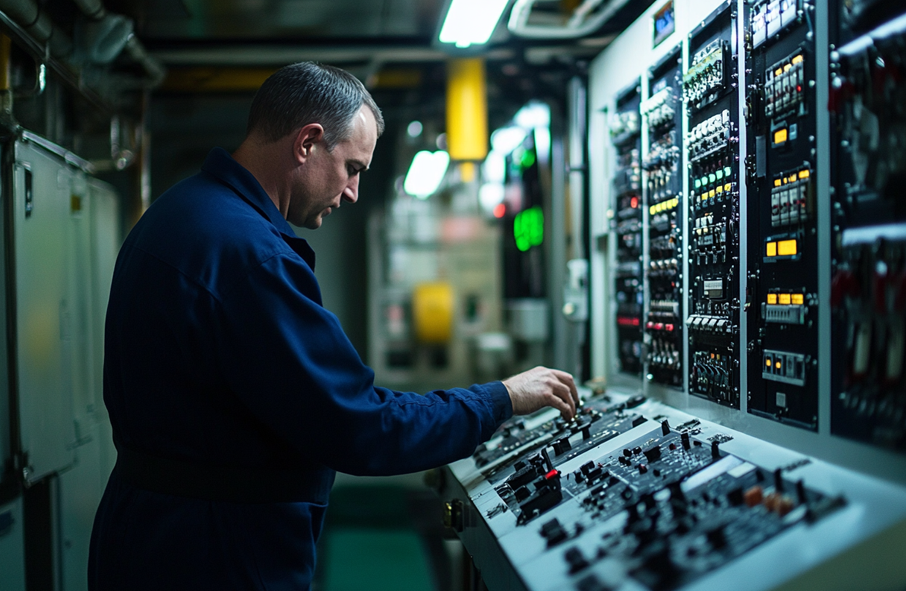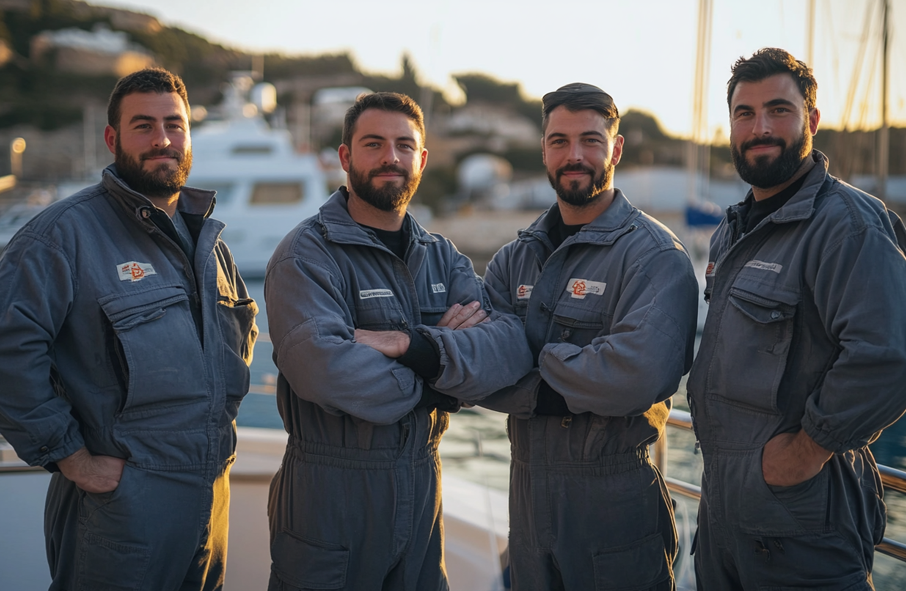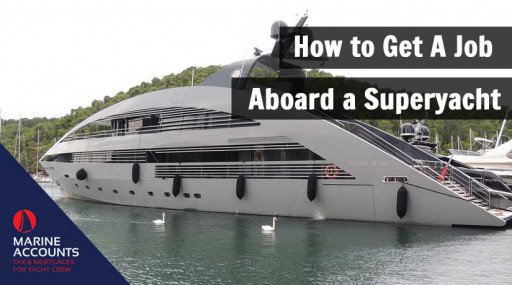What Does a Chief Engineer Do On a Superyacht?
- Authors
-
-

- Name
- Patrick Maflin
-

A Chief Engineer on a superyacht holds a pivotal role, ensuring the vessel's mechanical and electrical systems operate seamlessly.
This position demands a blend of technical expertise, leadership, and adaptability to maintain the yacht's performance and guarantee the safety and comfort of all aboard.
Chapters
- What is a Chief Engineer?
- What Does a Chief Engineer Do on a Yacht?
- Challenges Faced by Chief Engineers on Yachts
- Engineering Department Structures on Yachts
- Required Qualifications & Certification
- How to Become a Chief Engineer on a Yacht
- How Much Does a Chief Engineer Earn?
- How To Find a Chief Engineer Job on a Yacht
- Conclusion
What is a Chief Engineer?
The Chief Engineer is the head of the engineering department on a superyacht, responsible for overseeing all mechanical and electrical operations.
They report directly to the Captain and manage a team that may include engineers, electricians, and Electro-Technical Officers (ETOs).
Their primary duty is to ensure the safe and efficient functioning of the yacht's systems.
What Does a Chief Engineer Do on a Yacht?

The Chief Engineer's responsibilities are comprehensive and multifaceted:
System Maintenance and Repairs
Oversee the upkeep and repair of engines, generators, air conditioning units, electrical frameworks, and water purification systems.
This includes troubleshooting issues and implementing preventive maintenance strategies to avert potential failures.
Team Supervision
Lead and mentor the engineering crew, delegating tasks, providing training, and ensuring adherence to safety protocols.
Inventory and Resource Management
Maintain an inventory of spare parts and essential supplies, ensuring timely procurement to support uninterrupted operations.
Regulatory Compliance
Ensure the yacht complies with international maritime regulations, including the International Safety Management (ISM) code, and maintain accurate records of all engineering activities.
Guest Support
Assist with guest services by ensuring all onboard systems, such as entertainment and leisure equipment, are fully operational and promptly addressing any technical issues that may arise.
Challenges Faced by Chief Engineers on Yachts
Operating as a Chief Engineer on a superyacht presents unique challenges:
High Expectations
Owners and guests anticipate flawless service, necessitating the engineering team to maintain all systems in optimal condition continually.
Resource Constraints
Unlike larger commercial vessels, superyachts have limited space for spare parts and tools, requiring efficient resource management and creative problem-solving.
Rapid Technological Advancements
Staying abreast of the latest technologies and integrating them into the yacht's systems can be demanding but is essential for maintaining modern standards.
Engineering Department Structures on Yachts

The structure of the engineering department varies based on the yacht's size:
- Chief Engineer (or Sole Engineer on small vessels): On smaller yachts, a single engineer may handle all responsibilities.
- 1st Engineer: Assists the Chief Engineer and may oversee specific systems or projects.
- 2nd Engineer: Supports the senior engineers and often handles routine maintenance tasks.
- 3rd Engineer: Typically responsible for daily operations and monitoring of machinery.
- 4th Engineer: Often involved in hands-on maintenance and learning the intricacies of the yacht's systems.
- Motorman: Assists with the operation and maintenance of the engine room machinery.
- Wiper/Oiler: Entry-level position responsible for general cleanliness and basic maintenance tasks in the engine room.
Required Qualifications & Certification
To serve as a Chief Engineer on a superyacht, specific certifications and qualifications are mandatory to ensure compliance with international maritime regulations and to uphold safety standards onboard.
STCW Chief Engineer (Yachts) Certification
The Chief Engineer must hold the STCW Chief Engineer (Yachts) certification appropriate for the yacht's engine capacity.
This certification ensures the engineer has the necessary skills and knowledge to manage complex yacht systems.
Merchant Navy Certification
For larger yachts, it is often required, or at least preferred, for the Chief Engineer to hold Merchant Navy Second Engineer or Chief Engineer certification.
Some superyachts mandate Merchant Navy certification due to the increased technical demands of larger vessels.
STCW Basic Safety Training Certificate
All crew members, regardless of their position or seniority, must possess a valid STCW Basic Safety Training certificate.
This certification covers essential safety skills, including fire prevention, first aid, personal survival techniques, and personal safety and social responsibilities.
Seafarers Medical Certificate (ENG1)
A valid Seafarers medical certificate, most commonly the ENG1, is required.
This certificate is issued by an MCA (Maritime and Coastguard Agency) approved medical professional and verifies that the crew member is medically fit to work at sea.
Without both the STCW Basic Safety Training certificate and a valid ENG1 medical certificate, it is not possible to work on board a yacht.
Additionally, recruiters will be unable to assist candidates in securing roles without these essential documents.
These certifications are critical not only for regulatory compliance but also to ensure the safety and efficiency of operations onboard superyachts.
How to Become a Chief Engineer on a Yacht
There are two primary pathways to becoming a Chief Engineer:
Commercial Shipping Pathway
This route typically begins with a sponsored cadetship, involving approximately three years of study and practical experience on commercial vessels.
Upon completion, candidates earn an Officer of the Watch (Engineering) certificate, making them eligible for junior engineering roles on large yachts.
Yacht Certification Pathway
Alternatively, individuals can pursue yacht-specific certifications, starting in junior positions and advancing through experience and additional qualifications tailored to the yachting industry.
How Much Does a Chief Engineer Earn?
A Chief Engineer’s salary can range from £5,000 to over £12,000 per month, depending on yacht size, experience, and whether the yacht is private or chartered.
Additional benefits may include bonuses, health insurance, and travel allowances.
One of the most attractive perks of working as a Chief Engineer on a yacht is the potential for tax-free earnings:
Seafarers Earnings Deduction (SED)
UK residents may qualify for the SED if they work outside UK territorial waters for at least 183 days in a tax year. This can make their entire income 100% tax-free.
Foreign Earned Income Exclusion (FEIE)
US citizens working abroad may exclude up to $120,000+ annually from federal income tax if they meet the physical presence test or bona fide residence test under the FEIE.
These tax incentives significantly boost take-home pay, making the role financially rewarding.
How To Find a Chief Engineer Job on a Yacht
Securing a Chief Engineer position can be achieved via multiple routes:
- Yacht Crew Agencies: Register with reputable recruitment agencies specialising in yacht crew placements.
- Online Job Boards: Platforms like Yotspot, Crewbay, and LinkedIn frequently list engineering vacancies.
- Networking: Building connections within the yachting industry through events, forums, and crew gatherings.
- Dockwalking: Physically visiting marinas and shipyards to introduce yourself to captains and crew, leaving your CV.
- Word of Mouth: Leveraging industry contacts and personal recommendations to learn about job openings before they are publicly advertised.
Conclusion
The role of a Chief Engineer on a superyacht is both challenging and rewarding, offering a dynamic career with excellent earning potential.
With the right qualifications, hands-on experience, and networking strategies, aspiring engineers can secure prestigious roles in the luxury yachting industry.
The opportunity for tax-free income, global travel, and working in a unique environment makes this career path highly appealing for technical professionals seeking adventure and financial rewards.
Disclaimer: Any advice in this publication is not intended or written by Marine Accounts to be used by a client or entity for the purpose of (i) avoiding penalties that may be imposed on any taxpayer or (ii) promoting, marketing or recommending to another party matters herein.






